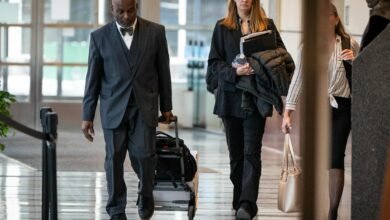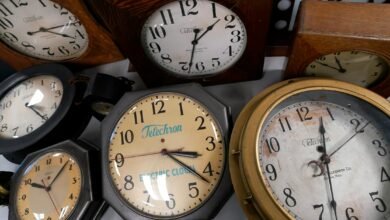
Jake Doiron stood in his driveway in Lino Lakes, about half a mile from the site of a proposed large-scale development that’s stirred up this small Anoka County city, and said he’s worried about losing its quiet, quaint appeal.
“It’s all just too much, too fast,” Doiron said late last week as he stood along Bluebird Lane. Several neighbors joined in to echo his concerns about plans for the 156-acre site, which would bring both housing and a mosque to Lino Lakes, led by a developer aiming his appeal at Muslim consumers.
Opponents of the Madinah Lakes proposal, which would add an estimated 1,200 to 1,300 new homeowners and renters on the site of an old sod farm, say they have legitimate concerns about stress on local infrastructure and about the developer’s background. But those who back the project have alleged that Islamophobia is also a factor.
“Should we make a decision based on the clothing we wear, and the hats we wear?” Lou Jungbauer, a 35-year resident of Lino Lakes, said last week at a contentious meeting of the local Planning and Zoning Board, which endorsed a one-year moratorium that would at least temporarily stall the project. The moratorium would also pause all residential development in the northwest quadrant of the city.
Jungbauer was cut off several times by the board chair when he raised the specter of Islamophobia. He said later that he went into the meeting opposed to the project, but changed his mind when he heard Muslim residents from Blaine and elsewhere express interest in moving to Lino Lakes.
“I saw that folks who want to come there have every good intention that I had 35 years ago,” Jungbauer said on Friday.
On Monday night, the Lino Lakes City Council was set to hold the first of what’s expected to be two votes on the moratorium, which the planning board recommended in order prepare a master plan for the area.
Faraaz Yussuf, the owner of project developer Zikar Holdings, has vowed to push ahead even if the moratorium is approved. Yussuf said he thinks the “vast majority” of Lino Lakes residents are welcoming, but he also sees anti-Muslim sentiment.
“Unfortunately, there’s a small group that from the onset had a lot of these racist, Islamophobic comments,” Yussuf said. “So I do think our concerns are justified.”
Doiron said the residents’ concerns are related only to the speed of growth in the community. “This group wants to come up here, start yelling buzzwords at us and getting their name in the Star Trib, and on TV, making it sound like we’re a bunch of racist Islamophobes, when that’s not the idea at all,” he said.
In addition to houses, apartments and the 10-acre mosque site, Madinah Lakes would include a new commercial corridor with restaurants, coffee shops and more.
At last week’s meeting, attendance swung slightly toward residents in opposition. They listed concerns about the increased water usage, the influx of kids to local schools, and broader worries the city will grow faster than it can handle.
Chatting with his neighbors near the site, Doiron said he’d rather see the Robinson Sod Farm transformed into a nature preserve. He and neighbor Theresa Deutsch said they’re worried Madinah Lakes will be too insular — a “city within a city,” Deutsch said.
Further north on Bluebill Lane, software company owner Dave Berg said he welcomes the new development, but also the moratorium.
“I think they are being reasonable to suggest taking time to consider all the issues,” Berg said. “Otherwise, I warmly welcome this community to the area. These big development projects take time to review, and this is not the first time a project has been delayed.”
Recently, hundreds of people have been attending weekly public council meetings, and almost all want to discuss Madinah Lakes — even if it’s not on the agenda. The crowd typically includes a mix of supporters and opponents, usually with signs reading “Slow the Grow.” The same signs have been popping up on lawns of homes lining Main Street.
Some project critics have raised concerns about the developer’s past; Yussuf was convicted of felony theft by swindle in 2013. According to the charges, in 2011 he made out unauthorized checks and electronic payments to himself from a previous employer, totaling roughly $20,000. At the time, Yussuf told a detective that he forged the employer’s signature on the checks, charges say. He took a plea deal and served three years of probation, court records show. A Hennepin County courts spokesman said Monday that Yussuf’s conviction was downgraded to a misdemeanor after he finished his probation, but that paperwork reflecting that change had not been properly updated.
In an interview, Yussuf said it was a wrongful conviction, that it was a “wrong place, wrong time” situation, and that he has worked to rebuild his life since it happened.
“It’s an unfortunate time but it’s part of what motivates me to continue to work hard and continue to build,” Yussuf said. “I don’t believe that I have to go through a public trial for something that happened where I’ve already paid the price on it.”
Yussuf, whose legal last name is Mohammed, said he started using a different last name following the conviction.
Council member Michael Ruhland, who moved for the moratorium in April, explained in an email that the city was juggling two large proposed development projects at the time. The other, a senior-living project, has not moved forward, but Ruhland wrote that officials still need to make sure there’s a solid development plan in place for a part of the city that hadn’t previously generated much developer interest.
“[S]ince we do have all of that interest, let’s get the plan on what it’s going to look like moving forward,” Ruhland wrote.
The council member said he was also concerned because of the city’s restrictions on groundwater usage from a lawsuit over water use near White Bear Lake. In May, a judge struck down a water use ban that resulted from the lawsuit. But Lino Lakes is still seeking to appeal two of the requirements the judge upheld
Lino Lakes Mayor Rob Rafferty and other City Council members have not responded to requests for comment on the project.
Yussuf said he thinks that some of the infrastructure concerns are valid. But he believes they don’t require a one-year moratorium to be addressed. Still, he said he doesn’t have any plans to sue the city if the moratorium is passed.
“I’m going to fight for the fact that I don’t believe in the moratorium and the fact that we can master plan it without a moratorium,” he said. “Ultimately, if the moratorium goes through, I’m always going to advocate for, ‘How can we continue to work together to make this happen?'”
Source link




